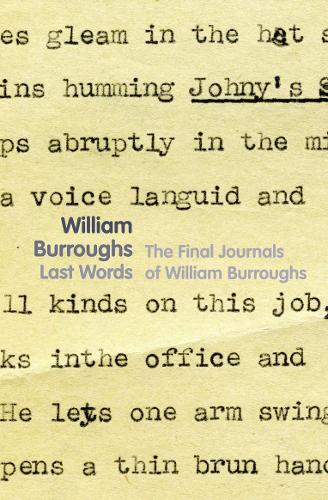
Last Words
(Paperback)
Publishing Details
Last Words
By (Author) William Burroughs
Introduction and notes by James Grauerholz
HarperCollins Publishers
Fourth Estate Ltd
13th July 2010
United Kingdom
Classifications
General
Non Fiction
Diaries, letters and journals
Literary studies: fiction, novelists and prose writers
Memoirs
Literary essays
Literary studies: c 1900 to c 2000
813.54
Physical Properties
Paperback
304
Width 129mm, Height 198mm, Spine 18mm
213g
Description
The journal of the last months of William Burroughs life.
20 November 1996: Well, its time for my Ovaltine and a long good night.
Burroughs died in 1997, after a lifetime of notoriety. The granddaddy of the Beats, druggy, dangerous and bleak, author of thirteen controversial, shocking novels.
In his final years, he was writing only in his journals. The last nine months of his diaries are here in Last Words, and they form a complex, rarely seen, personal portrait of Burroughs at the end of his life, coming to terms with ageing and death. Although well into his eighties, the man we see is nevertheless the same old Burroughs, still riling against the Establishment, still contemptuous of the state of the human race, still shocking, bleak and very funny. The diaries are full of anecdotes and memories, entries on the joys of housekeeping, dealing with doctors, shooting a video with U2, musings on his beloved cats, drug-taking and government cover-ups.
These journals contain some of the most brutally personal prose Burroughs has ever written. The deaths of his friends, Allen Ginsberg and Timothy Leary, provide a window onto the preparations he was making for his own death a quest for absolution marked by a profound sense of guilt and loss.
Reviews
He is a writer of enormous richness whose books are a kind of attempt to blow up this cosy conspiracy, to allow us to see the truth. J. G. Ballard
These journals make for unbearably poignant reading. Unlikely as it may sound, Bill Burroughs was only human after all. The Times
An exploration in depth, and in sum, of Burroughs personality and creative pre-occupations[A] rich repetition, with variations, of a string of half-conscious fancies, scenarios and literary allusions. Last Words also presents fresh clues to the larger design of his imagination, and a means of gaining a renewed perspective on his work. New York Times
Last Words reveals the author of Naked Lunch riddled with arthritis and still saddled with guilt for shooting his common-law wife in 1951. Although he seems more vulnerable than ever before, the anti-establishment anger continues to flare up at odd moments, his skewed sense of humour still sends out sparks. Time Out
Theres a savage glamour about William Burroughs, both in his writing and his lifeLast Words, made during the last nine months of his life, shows him to be as sharp-minded as ever. Ham & High
Elegiac and filled with a curious kind of contentment at the way things have turned out. For the first and only time, he reveals a gentler self, full of years and filled with grace. He was a great American writer to the end. Gay Times
Fascinating. Burroughs surfaces among his words as a bent, acute, watchful, irritated, clever old man, like a sparkling eye peering out from the greasy broken panes of a dilapidated building. Financial Times
Last Words is filled with memories and reminiscences delivered in staccato poignancy. Burroughs cuts up his recollections and dreams, merging, always playfully, sometimes painfully, fact with fictionA welcome addition to the extensive Burroughs oeuvre. Scotsman
Author Bio
William Burroughs was born in St Louis, Missouri in 1914. Immensely influential among the Beat writers of the 1950s notably Jack Kerouac and Allen Ginsberg he already had an underground reputation before the appearance of his first important book, Naked Lunch. William Burroughs died in 1997.
